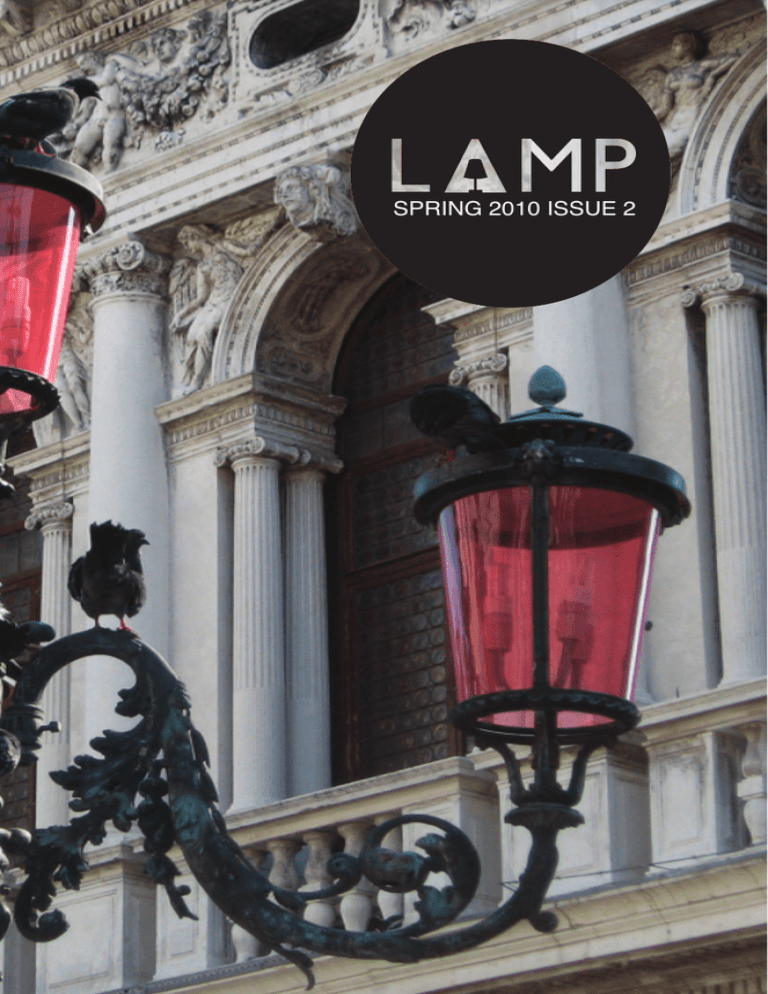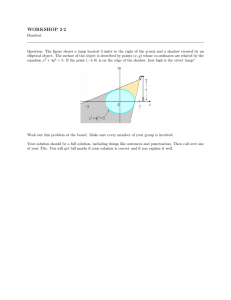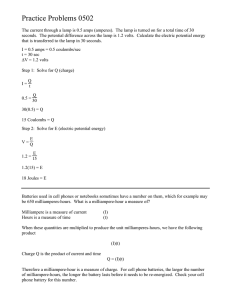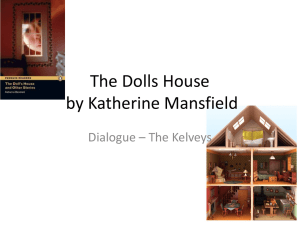
SPRING 2010 ISSUE 2
1
LAMP
LAMP is a literary magazine which publishes creative
pieces and critical essays written by current students and
alumni of Liberty University; the views expressed are those
of the contributors and do not necessarily reflect those of
the LAMP staff or Liberty University. LAMP aspires to
stimulate readers both within and outside the University
with the creativity and critical work of its contributors.
The LAMP staff would like to thank Mr. Danny Horsley
and Seckman Printing for the printing of this issue. Their
generosity has helped to make this issue possible. Visit them
on the web: http://www.seckmanprinting.com.
All rights reserved. No part of this publication may be
reproduced without prior permission of the publisher. ©
(2010) Liberty University.
General Faculty Advisor
Dr. Karen Swallow Prior
General Editor
C. Ryan Knight
General Editor
Nick Olson
Contributing Edifor: Nonfiction
Sanuel Loncar
Reader: Fiction
Mr. T. Marcus Christian
Reader: Poetry
John Gosslee
2
LAMP
Graphics / Layout Faculty Advisor
Professor Edward Edman
Graphics / Layout Editor
Cara Williams
LAMP
Contents
April 2010 - ISSUE
6 . . . . . . essay. . . . . . . . . . . . On Lynchburg : Sometimes First Impressions
are the Least Reliable
Jennifer Schmidt
7 . . . . . . photography. . . . . . Untitled
Chelsea Courtney
8 . . . . . . poetry. . . . . . . . . . . Kayley’s Last Notation
Jonathan Devin
9 . . . . . . photography. . . . . . Goodbye Balloons
Cara Williams
10 . . . . . book review. . . . . . . Domestic Complexities
Marilynne Robinson, Home: a Novel,
publication info
Anna Batson
12 . . . . . interview . . . . . . . . On "Dangerous Moviegoing": An Interview
with Jeffrey Overstreet
Nick Olson
16 . . . . . photography. . . . . . Untitled
Chelsea Courtney
20 . . . . . poetry. . . . . . . . . . . Intersection
Emily Anne Boyter
21 . . . . . photography. . . . . . Half a City Life
Cara Williams
22 . . . . . essay. . . . . . . . . . . . The Intellectual Life: An Essay
Samuel Loncar
25 . . . . . photography. . . . . . Quiet Morning
Cara Williams
26 . . . . . poetry. . . . . . . . . . . The Suicide of Ajax
Kelly Hamren
26 . . . . . poetry. . . . . . . . . . . Game of Chess
C Ryan Knoght
27 . . . . . photography. . . . . . Pear
Cara Williams
26 . . . . . poetry. . . . . . . . . . . From the Greek
C Ryan Knight
FRONT AND BACK COVER BY CARA WILLIAMS
LAMP LOGO BY JOHN CARL
LAMP
3
Letter from the General Editor:
In this issue of LAMP – the fourth and final of the 2009-2010
academic school year – a baton of sorts is being passed: C. Ryan
Knight will graduate in May, and I will guide LAMP into its promising future. Two years ago Ryan and I engaged in a conversation
about the mutual desire to see a magazine of sorts distributed on
Liberty University’s campus and in the Lynchburg area that allowed for the publication of poetry, short fiction, and varieties of
non-fiction; though many people have played a significant role in
LAMP’s birth and gradual growth, a great deal of gratitude is
owed to Ryan for enduring the many birth pangs associated with
undertaking the Editor position of a new publication. Yet, perhaps most importantly, Ryan has been instrumental in edifying the
“community of writers” on LU’s campus; he leaves us with two
pieces of poetry in this issue for our consideration.
And it is precisely a sense of community that LAMP aims to cultivate within the Lynchburg area and beyond – a community of
interlocutors that provides both active and written prosaic gestures
for one another. The imprints of this goal are all over this issue:
two former students in the LU community – Samuel Loncar and
Jennifer Schmidt – have contributed essays, respectively, on what it
means to pursue inhabitance in the academic community with the
primary goal of pursuing truth, and on aspects of life in the Lynchburg community; a former student of my own, Jonathan Devin, has
contributed a poem; and I am pleased to present LAMP’s first interview – a discussion regarding film with author and editor Jeffrey
Overstreet.
4
LAMP
Voices concerned with the betterment of our community – from
within and without, from former and current presences, students
and colleagues – contribute warnings, reminders, and pleasures to
our ever-forward sojourn. Yet, even in this temporal existence, we
wayfarers grasp for a sense of home with one another; that is, we
all long for the edification and upbuilding that promote and instill
acceptance and loving-kindness within a community – even if, in
this life, permanence is beyond reach.
In an interview regarding her award-winning novel Home (reviewed
in this issue by Anna Batson), Marilynne Robinson comments
that “the real emotional content of lives tends to be negotiated
in terms of small gestures, little courtesies towards one another,
little provisions for one another's comfort, and that whether we're
conscious of these things or not we read them continuously as a
sort of [pause] we see them as the fabric of our lives with others,
and I think that a great deal of generosity and care and love and so
on are communicated in what we would call prosaic gestures, and
that's just lovely to me.”
Me, too.
Nick Olson
LAMP General Editor
LAMP
5
On Lynchburg: Sometimes First
Impressions are the Least Reliable
Jennifer Schmidt
Within the span of ten days I had decided to transfer universities. The timing only
intensified an already stark contrast. From a state university housing over 35,000
students and residing a short train ride from New York City, I had decided to move
to Lynch . . . berg? I wasn’t sure on the spelling, but the name’s connotation was
enough for me to conveniently forget it. And, despite its classification as a city, I
could think of it as nothing more than a big town. Cities demand gridded blocks of
government housing, parking meters, and the semblance of a foreign district. Not
only was Lynchburg lacking such definitive characteristics, but it constituted nothing more in my estimation than a sprawling mass of crisscrossing roads. It’s not a
stretch to say I had low expectations for my new surroundings; in fact, I would go so
far as to say I had no expectations at all.
I rarely ventured farther than Wards Road during my early years in Lynchburg.
I considered Timberlake Road an adventure “to the other side” and only heard of
the downtown district in the news. New friendships made near the end of college,
however, led to some unexpected discoveries, and they in turn spawned further interest on my part. Of course, these discoveries were not clandestine secrets as much
as they were features simply overlooked on my part. The more I ventured from the
typical dollar theater and Macado's routine, the more surprises I found. Hiking the
Blue Ridge Mountains between Lynchburg and Roanoke, traversing creek beds and
streams, canoeing the James beneath the shower of the geyser, and finding roadside
stores with homemade peach ice cream were experiences both foreign and transcendent. Through them all, I was changing and slowly beginning to love this ill-named
town of the south.
Now, five years after moving here, I am more firmly convinced than ever that Lynchburg is a fascinating enigma; it defies simple categorizing. Its rich history spanning
over 200 years is evident from the cobblestones of Commerce Street to the ancient
head stones dotting the horizon of the Old City Cemetery. I’ve also learned that this
town was not named for a despicable practice, but rather after a certain John Lynch,
a progressively minded entrepreneur who established a ferry crossing in the mid1700s. Arts, theatre, agriculture, economics, and education all hold equal and well-
6
LAMP
established footings here, reminding me that Lynchburg is a place built by the dead
and appreciated by the living. Over time, whether biking Black Water Creek trails,
perusing wares at the Community Market, or enjoying an outdoor production of A
Midsummer Night’s Dream, I’ve realized how much there is to enjoy here.
Perhaps it was my original disposition which made me all the more receptive and
grateful for the variegated facets of Lynchburg. Over time my opinion of Lynchburg
has slowly changed from that of a place meant to be survived to one that cannot be
forgotten. Much like the story of two lovers who hated one another upon introduction only to fall in love years down the road, my appreciation for Lynchburg is now
unmatched by any single place.
Driving the now familiar curves of Route 221 on my way to work, I daily anticipate
the breaking of the horizon with the mountains – the dramatic and ever changing
beauty of those blue ridges. More than anything, it is this natural phenomenon that
has made me forgetful of the big city life. Adam speaks in Twain’s fictional account
of the Garden of Eden of Eve’s fascination with stars, saying, “None of them is of
any practical value, so far as I can see, but because they have color and majesty, that
is enough for her, and she loses her mind over them.”
It’s a similar insanity that binds a girl with Jersey roots to such an Eden as Lynchburg.
Untitled
Chelsea Courtney
LAMP
7
•
Kayley’s Last Notation
Jonathan Devin
A gentle hum numbs the ear: static in the wind now.
Composed with other lost notes and melodies never to be heard,
Save in that second of collision, the soft blurs quietly observed.
Quotation and notation, direction for the lost,
And orange haze with cocktails tickles nostrils straight across.
8
LAMP
Goodbye Balloons
Cara Williams
LAMP
9
Domestic Complexities
Marilynne Robinson, Home: A Novel
(Farrar, Straus, & Giroux, 2008)
Reviewed by Anna Batson
Mirroring the events of her Pulitzer Prize-winning novel Gilead, Marilynne
Robinson’s newest novel, Home, takes place in the same small town but tells the
story from a very different perspective. Home is a luminous, profound novel that
explores the question, “What does it mean to come home?” through the prodigalson story of Jack Boughton, his father, the Reverend Boughton, and his sister, Glory.
Jack returns to Gilead and his family destitute and an alcoholic, but begins to forge
a bond with Glory, who, after breaking off an engagement, has only moved back
to Gilead to take care of their ailing father. The simplicity of the narrative allows
Robinson to develop individuals who are deeply complex and even contradictory,
individuals in whom we recognize qualities of our family and friends, and even of
ourselves. Through these characters, Robinson convincingly illustrates that it is only
within the safe haven of community—particularly family—that grief and hurt can
be overcome and the soul finally find rest in its “home.”
For the Boughtons, home is not simply a street address, but also the residence
of tradition, memory, and inevitable pain. Recounted primarily from Glory’s
perspective, the Boughtons’ interactions represent a long history of disappointment,
loyalty, and forgiveness that creates a beautiful portrayal of the costs and rewards
of family relationships. The Reverend’s pain resulting from Jack’s transgressions is
10
LAMP
especially poignant, for although his favored son chose to become a philanderer and a
drunkard, “forgiving [Jack] was deeper even than habit, since it was in fact the sum
and substance of loyalty.” Glory and Jack’s familiarity increases as they each become
aware of the other’s trials; at one point, Glory reprimands Jack, whispering, “Has it
ever, ever occurred to you that you are not the only miserable person in this house?”
Her frustrations with Jack are intensely personal, as they bring to light her own
shortcomings and disappointments. Ultimately, however, the persistence of honesty
and steadfast, familial love results in a catharsis that, though it does not lead to a
“happy ending” per se, “implies that help and kindness and loyalty are owed where
they are perhaps by no means merited. Owed, that is, even to ourselves.”
Robinson complements her beautiful themes with beautiful prose. In Gilead, the
expression is breathtaking, reflecting deep meditation on the significance of
language. In Home, Robinson’s prose takes a turn from Gilead toward simplicity,
largely due to a significant increase in dialogue, but does not sacrifice the richness
of prose that has established Robinson’s acclaim. Read aloud, the words are softspoken and gentle, an ideal vehicle for her exploration of “home,” in all its intricate
complexities. In the end, we are reminded that “home” is not so much about a place,
but about people and their need to be forgiven, accepted, and made whole. “In
destitution,” Robinson writes,
[E]ven of feeling or purpose, a human being is more hauntingly human and vulnerable to kindnesses because there is the sense that things should be otherwise, and then the thought of what is wanting and what alleviation would be and how the soul could be put at ease, restored. At home. But the soul finds its •
own home if it ever has a home at all.
LAMP
11
•
On “Dangerous Moviegoing”:
An Interview with Jeffrey Overstreet
Nick Olson
(Jeffrey Overstreet is in the midst of writing a fantasy series entitled Auralia’s
Thread. The first two novels in this series – Auralia’s Colors and Cyndere’s Midnight
– were published in 2007 and 2008, respectively. Raven’s Ladder, the third of the
intended four-novel series, was released in February of this year. Jeffrey’s awardwinning writing regarding the arts – particularly film – has been published in Image,
Christianity Today, and Paste. He is a contributing editor to Seattle Pacific University’s
Response magazine and publishes frequently on his web site, Lookingcloser.org.
Jeffrey’s 2007 Through a Screen Darkly, is a self-proclaimed “travelogue of dangerous
moviegoing.” It is with interest in Jeffrey’s approach to film-watching that I am here
presently engaging him).
In your book, Through a Screen Darkly, you make a distinction between films that
are merely entertaining and films that point to beauty and mystery. In your
mind, are there some general distinctions between these two types of films?
Are the films being produced a reflection of the consumers and their culture?
Some movies give us stuff to watch, stuff that provokes immediate reactions — gasps,
laughs, groans, screams. They’re like rides; you buy a ticket, you have some thrills,
and then you may buy a ticket to go do the same thing again. I just saw The Wolf
Man, and it was kind of like that. It was fun while it lasted. But few of those movies
improve with each ride. They leave you wanting something more.
Have you seen Bedtime Stories, starring Adam Sandler? I hope, for your sake, that
you haven’t. I had to watch that movie on an airplane. It was awful. It’s one of those
movies that tries to give people everything they want: true love, racy romance, cute
kids, adult humor, wild special effects, grotesque monsters, Princess-Bride chivalry,
make-believe sports along the lines of Harry Potter’s quidditch matches. It even has
a break dancing guinea pig. It’s absolutely ridiculous. And it throws these things at
you furiously, as if the filmmakers assume their audience has a serious A.D.D.
That’s not why I go to the movies. I go because I want to have an experience that
will make me feel and think. I want movies that will give me questions to consider,
12
LAMP
matters to discuss and debate, and they give us reason to go back and think through
the experience.
If I’m paying ten bucks to see something on a big screen, I want something more
than just a camera turned on while actors recite lines or crash cars. I want to see
something that uses the big screen as a canvas, revealing images that invite us to
consider their composition, and to ponder the relationships between light, dark,
performances, writing, editing, and more.
Far too often, I walk away from movies that are no more memorable than the previews
that played in front of them. Many — perhaps even most — American movies are
constructed by committees who load them with whatever flashy elements will put
butts in theater seats. They keep our eyes on the screen, but they give nothing to
our gray matter. Art requires participation, but most movies these days don’t inspire
much more than a reaction.
My favorite films are those that — even if I find them difficult or challenging or even
boring at first — are still on my mind days, weeks, even years later. I like films that
draw me back to keep thinking about them, to keep watching them and discussing
them and interpreting them.
If your life was threatened to give a response, what are your five favorite films
in order (the five films that you have enjoyed most or having impacted your life
most?)? Also, what were some of your favorite films in 2009? And why?
Oh, it wouldn’t take a threat! I’m always happy to rave about my personal favorites.
There are several movies I try to see at least once a year, because I get so much out
of them every time. But they’re all very different, and they require close attention.
Wings of Desire, by director Wim Wenders, is like an epic poem about curious angels,
broken human beings, and the full range of human experience.
Three Colors: Blue is a beautiful meditation on grief, art, and freedom, made by my
all-time favorite director, Krzysztof Kieslowski. Juliette Binoche gives my favorite
performance by an actress.
Terrence Malick’s film The New World revisits early America and the story of
Pocahontas and John Smith, and it becomes a hymn to the beauty of creation, and an
epic poem about the struggle between the ego and the conscience.
Babette’s Feast, by Gabriel Axel, is one of the greatest pictures of grace I’ve ever
seen.
And then there’s Raiders of the Lost Ark, by Steven Spielberg, which is my favorite
LAMP
13
adventure film of all time. It takes the conventions of cliffhangers and fills them up
with something transcendent. It has great characters, snappy dialogue, awe-inspiring
stunts, and a compelling story that subverts common hero stories and gives God the
last word. There are many other adventure films I love—like The Empire Strikes Back
and The Fellowship of the Ring—but in my opinion, Raiders has no equal.
Looking back at 2009, which was a great year for adventurous moviegoers, I found
several I’d like to have in my personal collection: Summer Hours, Munyurangabo,
Seraphine, Up, The Class, Lake Tahoe, A Serious Man, Gomorra, Coraline, and Where the
Wild Things Are. I could write a book on any of these films.
Christians have the tendency to judge a film by its content. That is, if there is
immorality present in the film, then the film is “bad” or it would be imprudent
for a Christian to view it. Do you think that it is merely a matter of a film
maker portraying truthful consequences to actions? Or is there a certain line
that even Christian artists shouldn’t cross in their depictions?
Well, some films portray immorality. And some films carry out immorality. It’s
difficult to discern sometimes, but it’s crucial that we learn the difference. It’s one
thing to expose evil, by portraying it and its consequences. It’s quite another thing
to portray evil in a seductive or glamorous way, so that audiences enjoy some kind
of lurid thrill.
It’s dangerous to portray people behaving badly and then leave out the consequences
of such behavior. Sure, the consequences are ugly, but they’re true. Martin Scorsese’s
gangster movies are violent because the criminals in his stories live lives of reckless
indulgence. If he didn’t show the messy consequences of their behavior, the audience
might be seduced by the allure of money, sex, and luxury. It’s just as important to
be honest about the consequences of materialism, or mean-spirited humor, or greed,
or ego, too.
Artists should show love for their audiences just as much as they show love for their
subject. That means if they’re portraying evil, they should do so truthfully, avoiding
any kind of excess. Excess hurts art. I’m always reminding myself of this as I write
my fantasy novels. Auralia’s Colors, Cyndere’s Midnight, and Raven’s Ladder all have a
lot of darkness and violence in them. If any element of a movie or a story draws too
much attention to itself in relationship to the rest of the picture, that’s damaging to
the art and, potentially, to the audience.
I think Christians should adhere to the same rules that govern other artists. Pursue
truth, pursue beauty, pursue excellence. Avoid anything that reduces the art to an
14
LAMP
act of ego, indulgence, or propaganda. We should be especially honest in portrayals
of faith. Most so-called “Christian entertainment” I have seen seem to promise that
Christian faith will deliver happiness and wishes that come true. That’s a lie. And
it will harden people’s hearts toward Christian faith, because they’ll see us as false
advertisers.
But there are some additional considerations for Christian artists. Christian artists
know they’re serving the Almighty, so they’d better care about learning how to
make art with excellence. That requires a lot of study. Further, we know where our
inspiration comes from, so we should work with humility and grace. And we should
attend to the creative expressions of others with compassion and humility, rather
than a spirit of judgment and moral condemnation. Most “Christian criticism” I
read consists of a long list of complaints, and very little thoughtful interpretation.
I love that you cite Flannery O’Connor when speaking of “excesses” in art. You
note that pornography, for instance, would be an excess. What exactly do you
mean by this and are there other “excesses” that are not as overt as sexuality
that average film-goers feast upon today to their unwitting spoil?
There are so many forms of dangerous and destructive excess in art. Christians get
so focused on sex, violence, and bad language that they become blind to the excesses
in what passes for “Christian art.”
For example, we’ve become accustomed to excessive glamour and materialism. Just
watch any half-hour of prime time TV – a drama, a comedy, whatever. Tell me,
is it true to life? Or are the people made up to appeal to us sexually, or are they
excessively entertaining just to hold our attention? If they are exaggerated, is it a
purposeful exaggeration? (The Simpsons exaggerates all the time, but for good reason.
By exaggerating, they help us see the ironies and absurdity of our own behavior.)
Most of the exaggeration we see in TV and the movies exists just to appeal to our
attention. And oftentimes, that’s appealing to our baser appetites.
You’ll probably see characters wearing very expensive clothes and makeup, actors
who have gone to great and even unethical extremes to appear attractive, cars
that are brand new and very expensive, and home environments that nobody I
know could possibly afford. Most adventure films pour on the violence merely to
entertain us, but do those scenes really contribute substantially to the storytelling?
Most comedies go for the easiest laughs, and that means they’re excessively crass.
Musical soundtracks often push us to experience particular emotions that the movie
itself hasn’t earned. And most Christian movies are excessively judgmental, or
they promise things beyond what the Gospel really promises — like happiness, and
LAMP
15
Untitled
Chelsea Courtney
16
LAMP
wishes that come true.
You discuss the ability – you call it a “science” that you want to learn – to
sift art for meaning. Do you believe all Christians are equipped, or called, to
attempt or pursue this sifting? Are some more equipped than others to sift
through more “restricted” material?
Philippians 4 exhorts all believers to let their minds “dwell” on “whatever is excellent,
whatever is worthy of praise.” We’re supposed to “test all things and hold fast to
what is good,” according to First Thessalonians. Paul was an effective teacher in
Athens because he knew the popular beliefs and poetry and culture. He was able to
recite pagan poetry, and then he was able to show how even the pagan imagination
was pointing toward the “Unknown God.”
Now, not everybody has time or money to go to a lot of movies or watch a lot of
television. But when we do choose to sit down and open our eyes and ears to the
culture and its entertainment, we have a responsibility to exercise our conscience,
and to make wise choices.
In Romans 14, we’re told, “One man’s faith allows him to eat everything, but
another man, whose faith is weak, eats only vegetables.” Clearly, this is a metaphoric
statement. But it’s true. Some people I know can work in very corrupt places, do
good work, and come away unaffected. Others would be distraught after an hour in
the same place, or else badly influenced by that corruption.
In the same way, some people have a sensibility that can encounter visions of severe
darkness and find something meaningful there; others would like to think so, but the
destructive effect of the profanity or the violence might be greater than anything
they might learn from the story.
Hebrews 15 says, “Solid food is for the mature, who by constant use have trained
themselves up to know good from evil.” And First Corinthians says, “Everything is
permissible for me—but not everything is beneficial. Everything is permissible for
me—but I will not be mastered by anything.” Each person needs to attend to his or
her own conscience and behave accordingly.
Christians often cry for more “Christian films” like Passion of the Christ or The
Lord of the Rings or The Chronicles of Narnia, but seem to automatically condemn
and dismiss films that are not overtly Christian in this way. Is there such a
thing as a “Christian film?”
God made all of us in his image, which means we all have some kind of God-given
creativity. What’s more, we all have eternity written in our hearts. That means that
LAMP
17
truth, beauty, excellence — all of the stuff that reflects God’s glory — can come
shining through the work of any artistic human being, believer or unbeliever.
I’ve been drawn closer to God by the truth and beauty in more movies made
by unbelievers than ones made by Christians. And most of the movies made by
professing Christians are usually more focused on preaching a lesson, or advertising
Christianity, than they are at giving us an imaginative experience worth talking
about.
I don’t like using “Christian” as an adjective. Should I go looking for a Christian
surgeon, or a good surgeon? Should I look for a Christian mechanic, or an expert
mechanic? Should we eat Christian meals, or nutritious meals? Should we drive
Christian cars, or cars that are made well? Good work honors God, whether the
worker knows it or not.
The truth is, there were several movies released in the last few years that came
from Christian filmmakers. They were beautiful, thought-provoking films. But they
were overlooked by Christian audiences. Why? Were they poorly made? No, they
won international awards. Did they cover up the issues of faith? Not at all. One –
Seraphine – dealt with faith directly, and it won more awards in France than any other
movie this year. Another – Ostrov (The Island) – was given public blessings by priests
and bishops who would stand in prayer outside the theaters when the film opened
in Moscow. Another – Munyurangabo – had an American director, Lee Isaac Chung,
who spoke very openly in interviews about his faith, and about how he made the
movie with the help of a Youth With a Mission team in Africa. Roger Ebert called
that one “a masterpiece.” But I’ll bet most Christians didn’t give it a second glance
in the video store.
So, why did most Christians ignore these films? Perhaps it was because the movies
did not provide simplistic “messages” like you might get in a children’s Sunday school
class. Perhaps it was because they weren’t advertised as “Christian.” Or perhaps it
was because American Christians can be as lazy as most other Americans, bothered
by anything foreign or subtitled. Perhaps it was because Christians are, like most
audiences, bothered by unattractive characters — and believe me, these movies did
not focus on glamorous celebrities.
So when many Christians start complaining that there aren’t any good movies out
there that reflect the love and glory of God, they just don’t know what they’re talking
about. They just show how little effort they’ve put into the search for meaningful art.
I noticed in your book Through a Screen Darkly that you devote a significant
18
LAMP
section to Michael Gondry’s Eternal Sunshine of the Spotless Mind, a film that you
recently devoted a blog post to and that was voted by Christianity Today editors
as the top film in 2004. What is it about Gondry’s film that is so well done
technically and what is it about his film’s content that resonates with so many
Christians? What principles about good films can be drawn from this one in
judging other films?
Well, Eternal Sunshine is a unique film – and a discomforting one.
It’s discomforting because its characters are like real people—they’re charming and
offensive, beautiful and ugly, strong and weak. The movie is brave enough to argue
with the typical Hollywood definition of true love. It dares to show us how hard it
can be to truly love someone, in spite of their failures and flaws.
And, like any good work of art, the form of Eternal Sunshine complements its
function. It takes place in the minds of characters whose brains are breaking apart,
and so the structure of the movie itself is fragmented, throwing us backward and
forward, mixing things up, contradicting itself.
But I wouldn’t say it is an example for all other filmmakers, except in the fact that
it has admirable themes and artistic excellence. Filmmakers need to consider the
needs of their own particular project, and the needs of their audience as well. They
need to take care to ensure that nothing in their film is out of place or excessive. If
it’s scary, there should be a reason for that. If it’s explicit, they’d better be able to
explain why that graphic material was necessary. Every piece should enhance the
whole, with excellence.
At the end of your book, you give suggested films for discussion groups.
I’m interested in your emphasis on community in this respect. Why do you
recommend discussion groups? What role does community play in this
discussion of Christians and film?
In my experience of art and entertainment, I’ve been so grateful to be part of
thoughtful classes and communities. Experiencing, considering, and discussing art
together, we’ve learned a great deal about ourselves and each other. And our eyes
have often been opened to aspects of the art that we would have missed otherwise.
Some of my favorite movies are films that didn’t impress me the first time, but later I
came to see their significance by talking to someone else or reading a review.
LAMP
19
Intersection
Emily Anne Boyter
People say decisions loom,
threaten like a thunderhead…
but mine look more
like a fog-enfolded road
splitting vaguely
in two directions;
six feet of muddy track
matted thick with soggy leaves
is a poor indicator
of where a road leads.
“Make a list,” they tell me,
“a list of pros and cons. That
should do the trick.”
I stand in the drizzle,
and in my need to understand,
I make a god
of clarity.
I linger, torn, because
the only thing I have
to live with
after this intersection
is the road
my choice will put me on
20
LAMP
•
Half a City Life
Cara Williams
LAMP
21
The Intellectual Life:
An Essay
Samuel Loncar
In his wonderful book The Intellectual Life: Its Spirit, Conditions, Methods, A. G. Sertillanges says that a man can devote himself to the intellectual life if he has two
hours every day to practice his calling. Being paid for this vocation is a luxury of the
few, just as being paid to work in a job that directly supports this vocation is also a
rare luxury. [Throughout this essay, A. G. Sertillanges’s words are set apart in italics] When we speak of vocation, we refer to those who intend to make intellectual work
their life, whether they are entirely free to give themselves up to study, or whether, though
engaged in some calling, they hold happily in reserve, as a supplement of their activity and
as a reward, the development and deepening of their mind.
We like to think we know exactly what our calling will entail, like working in a
university, or being paid as a researcher. But these proper goals, towards which we
order our lives to fulfill our calling, are not guaranteed us. I know I am called to
pursue and share truth; I believe I am called to pursue and share truth in the university. Thus I order my life towards that latter, proximate end as a way of working
towards the former, ultimate end. But many believe they are called to the university;
some of us are, by necessity, wrong – we know this because there are not enough
places for all of us. When we overly specify our calling, we open ourselves to a deep
blindness, one that stops us from seeing other opportunities as anything but failures.
Thus the scorn we heap on other avenues, righteously sure that these will not, cannot, be our fate. This involves confusing our good desires with our calling. Some
people happily get what they desire. They often have an academic variation on the
theme philosophers call ’moral luck.’ Others work equally hard, lacking this luck,
and through their frustrated desires God teaches them other ways in which they can
fulfill their calling.
A Christian professor can know he is called, now, to be a professor; a Christian student can know, now, he is called to be a student. A student cannot know, now, he is
called to be a professor. He believes. Tomorrow he may die. In six months his life may
radically change. In a year his parents may require his personal care. The future is
not given to us, except for to plan in prudence and wisdom. All else is presumption:
“Go to now, ye that say, To day or to morrow we will go into such a city, and continue
there a year, and buy and sell, and get gain: Whereas ye know not what shall be on
22
LAMP
the morrow. For what is your life? It is even a vapour, that appeareth for a little time,
and then vanisheth away. For that ye ought to say, If the Lord will, we shall live, and
do this, or that” (James 4:13-15). If the Lord wills. This is the necessary, if not sufficient, condition for our most simple intentions.
The intellectual life is a high calling, but it brings no sure temporal reward. Calling
to this life is calling not to recognition, status, or payment.
How much could be said of this fundamental disposition as it affects a career entirely
devoted to the life of thought! I have spoken of the opposition and lack of understanding
that the great are exposed to; but these things are the lot also of the little; how can they
be resisted without single-minded attachment to the truth, and without complete selfforgetfulness? When the world does not like you it takes its revenge on you; if it happens
to like you, it takes its revenge by corrupting you. Your only resource is to work far from the
world, as indifferent to its judgments as you are ready to serve it. It is perhaps best if it rejects you and thus obliges you to fall back on yourself, to grow interiorly, to watch yourself,
to deepen yourself. These benefits are in the measure in which we rise above self-interest,
that is, in which interest centers on the one thing necessary.
The intellectual life is essentially about truth; the academic life is accidentally about
truth. The intellectual will wrest his academic position towards the pursuit of truth.
Thus he fulfills his calling in the academy.
Can we be called toward recognition, status, and compensation for our intellectual work? No. These may be accidents of our essential task, gifts for which we are
grateful. But they are not our calling. Tear away recognition, status, and compensation from the academy; tear away, that is, self-interest, rise about it, and ask if the one
thing necessary is really that to which one is called. If it is, you can and will pursue
it without recognition, status, or compensation.
At its best, higher education facilitates the intellectual life by richly enabling the
pursuing and sharing of truth. At its worst (and I fear this is more common), it
obstructs the pursuing and sharing of truth. If God blesses the intellectual with
support from the academy, he must studiously ignore its obstructions and fulfill his
calling, gratefully freed from other concerns.
But this is difficult. Higher education inculcates vices that strike into the roots of
our being, corrupting all our fruit. It prods us to study and write about things with
no intrinsic value; it corners us to subordinate the true and the permanent to the
expedient and the transitory. It urges us to publish for status, advancement, and
recognition, not because our work is true, important, or valuable. It is simply publishable. We may think, “I just need to get some things out there, but eventually I’ll
turn to the important topics, etc.” Here we make the naïve assumption that our habits
LAMP
23
can simply go away; that our being has not been reshaped through the ends toward
which we have ordered our desires and the means we have used to achieve those ends.
This was profoundly illustrated by a student with whom I studied German. Intent
on becoming a manager in professional baseball, he subordinated all of his academic
pursuits to that end. When discussing the importance of books, which he never read
(too long, too much time – just articles for him), he said, “Once I’m successful, I’m
going to get a huge library and read all the time.” I felt terrible, but knew I could
not persuade him how distorted a view of habituation and personhood this reflected.
Every paper we write, every project we pursue, is a soul-making act, reflecting and
shaping our deepest commitments, supporting virtue or nurturing vice. Every sacrifice of the best and the true for the expedient is an act against ourselves and our
fellow-men, reflecting and nurturing disordered loves.
“Tell me what you love, I will tell you what you are.” Love is the beginning of everything in
us; and that starting point which is common to knowledge and practice cannot fail to make
the right paths of both in a certain measure interdependent.
Truth visits those who love her, who surrender to her, and this love cannot be without virtue. For this reason, in spite of his possible defects, the man of genius at work is already
virtuous; it would suffice for his holiness if he were more completely his true self.
The true springs up in the same soil as the good: their roots communicate. Broken from
the common root and therefore less in contact with the soil, one or other suffers; the soul
grows anemic or the mind wilts. On the contrary, by feeding the mind on truth one enlightens the conscience, by fostering good one guides knowledge.
Sertillanges understood the premise that renders our arguments for the humanizing
effects of the humanities sound, and without which they are so much self-important
humbug. It is this: the humanities are about truth. When the custodians of culture
stop believing and practicing this truth, they have betrayed their trust, forfeited
their authority, and sold their birthright for a mess of pottage. Their authority and
dignity pass to those who profess truth, who insist that their work is about reality,
and that reality is the standard against which it should be judged. If, then, these custodians use their profession to get benefits and authority not rightly theirs, if they
swindle the culture because its eyes are dim, we can complain only about that which
we have given away, lament only the treachery we make possible.
The humanities are an abstraction; they are books and people, teachers and scholars,
who make up the concrete world the abstraction signifies. The humanities are as
healthy or as weak as its custodians. The custodians are what they love. Thus we
need lovers of truth, those called to the intellectual life, working in the academy. But
24
LAMP
we need them in that order: lovers of truth, called to the intellectual life, and, if
blessed and fortunate, working in the academy.
Bypassing the love of truth and the demands of the intellectual life and pursuing the dangerous, abstract remainder, “working in the academy,” will not solve our
problems, as teachers, scholars, students, or cultural custodians. It will deepen them.
If God calls us to the academy, if we find ourselves in it and we can thus say that we
are so called, it should be because we arrived there on our journey towards truth, and
we should remain there only as long as it supports and does not hinder that journey.
In the end, that journey is the only one that matters, for when our eyes are too dim
to read, our limbs too weak to walk, and our lungs too tired to breathe, when recognition is a dim memory or a vain wish, we will rest blessed in the Truth, Goodness,
and Beauty that we have loved and for which we have lived, or we will complete
our journey away from Truth, Goodness, and Beauty, receiving in full measure that
which we loved and for which we lived.
Quiet Morning
Cara Williams
LAMP
25
The Suicide of Ajax
Kelly Hamren
•
You would not drink the blood, nor would you speak,
Your mortal powers were spent but not your ire.
Ulysses shrank beneath your glare, you shade,
As scorning him entirely
You drifted down the path by empty soles of spirits made.
You were too strong in life; now weak in death,
Alone you wander daily by the Styx.
No voice beside recounts how once your spear
Through shattered armor fixed
In hearts of Priam’s men, who shrank from you in fear!
You were too strong in life, even as you stood
Before stout-hearted Hector unafraid.
Even as you raised your spear against the throng
That for your strong ships made,
And drove them back from there in terror: then you were too strong!
You were too strong in life, you stood alone,
With none beside but he who shared your name.
As one by one the others’ blood was drawn,
You lived up to your fame,
And saw the hosts of Troy thrown back in mad retreat at dawn.
You were too strong in life, you could not bear
To lose the prize that was your soul’s delight.
Oh warrior, could your strength not once abate?
Had you a sage’s sight,
Perhaps – but no, the armor lost, you met a tragic fate!
You were too strong in life and dealing death.
Had you seen past the curtain of strong wine,
Your sword had rested stainless by your side.
O deed without design!
O blade moved not by thought or reason but by wounded pride!
26
LAMP
You were too strong in life—you could not leave
Long unavenged that soul to Hades sent.
Your sober eyes knew well that blameless friend,
Whose lesser strength was spent,
And on that tainted sword came soon your own inglorious end.
You would not drink the blood, nor would you speak,
For what is there to say when strength has fled?
When once your greatness crumbles into dust—
Proud helm upon your head
Has fallen, lays beside the sea, and molders into rust?
Pear
Cara Williams
LAMP
27
•
Game of Chess
C. Ryan Knight
Felt-footed pieces trip,
guided by the missteps
of the mind amidst
this cognitive crossfire.
The whittled king and queen
cannot unseal their lips
to address their subjects:
Kill, capture their tiles.
Rooks unfound themselves
from cornered mounds
and ground themselves elsewhere
like explorer’s flags.
A peasantry of pawns, yes,
but an ambassador?
Nowhere to be found.
Polite barbarity is all.
The sidestep blitz of slender bishops,
the way they flank their enemies,
still seems unsanctioned
though rules of war permit it.
Could they, would they
strike up a ditty,
a national anthem,
a threatening jingle?
28
LAMP
•
Thank God, the knight thought,
this isn’t checkers.
How would I ever train
a horse to hurdle enemies?
Hours wear and pass, pass and wear
the players. The carved pieces
don’t complain, defecate,
or laugh. Only motion, only death.
The mind a puppeteer,
the pieces below marionettes
unstrung but possessed by the mind,
vengeful God, fatal sky.
Endgame they voicelessly chant—
a word they learned in the dark
when stowed away in a box,
the rules of the game their comforter.
LAMP
29
From the Greek
C. Ryan Knight
As though Athena tattooed
love along the bumpy mass
of my throbbing heart,
her Attic letters illegible
yet the divine ink saturating
each appendage of this flesh,
my flesh, redirecting my eyes
toward what love loves:
everything in sight, everything,
even all beyond sight’s cracked scope:
the uncolored, the unnamable,
the unspeakable, the… the…
•
30
LAMP
The LAMP staff would like to thank the following
individuals and organizations at Liberty University:
Dr. William Gribbin
Dean of the School of Communications
Dr. Mark Harris
Professor of English and
Director of the Master of Arts Program in English
Dr. Emily Heady and the Graduate Writing Center
Mr. Danny Horsley and Seckman Printing
Contact:
Dr. Karen Swallow Prior
(General Faculty Advisor):
kprior@liberty.edu
Nick Olson
(General Editor)
nsolson@liberty.edu
LAMP
31
“If I’m paying ten bucks to see something on
a big screen, I want something more than just
a camera turned on while actors recite lines
or crash cars. I want to see something that
uses the big screen as a canvas, revealing
images that invite us to consider their
composition, and to ponder the relationships
between light, dark, performances, writing,
editing, and more.”
Jeffrey Overstreet
32
LAMP








